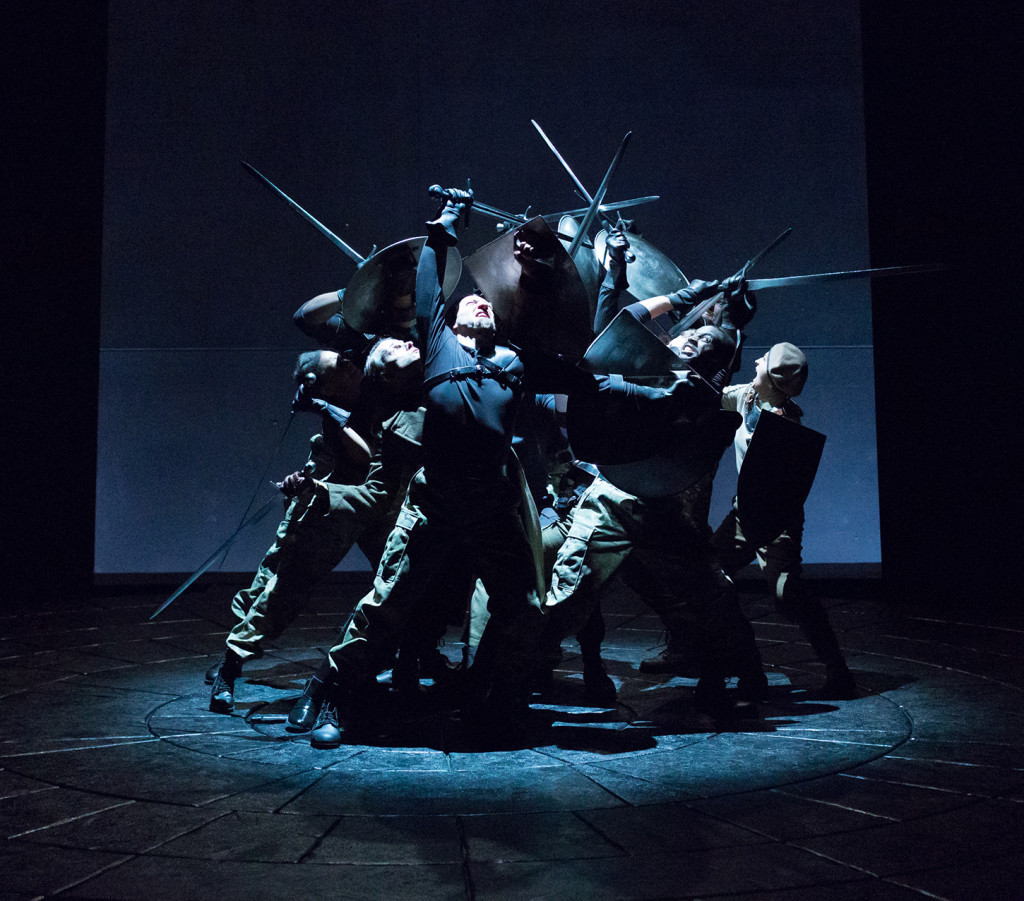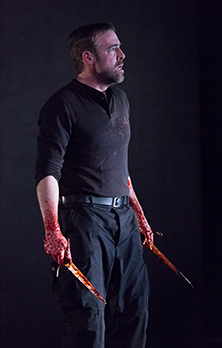Note: This review is part of a new feature section on Phindie: Critical Mass. Each week during the play’s run, a reviewer from this publication will return to the Arden to reconsider the work and respond to previous critical takes. Read more about this here.

When Hamlet directs his Player King on how actors should act, he says: “ Do not saw the air too much with their hands, thus but use all gently, for in the very torrent, tempest, …Be not too tame neither, … suit the action to the word, the word to the action;”
Unfortunately, in his directorial debut on the Arden’s F. Otto Haas Stage, Alexander Burns does not dish out the same direction to his players. The audience is left sitting in the fog-filled theater, in front of the glorious bare black stage (Brian Sidney Bembridge, set) watching a company of actors with feet rooted to the spot raising their arms as rigidly as Ken dolls. Hamlet would not have approved.
I was and am a champion of Alex Burns. His all-male Quintessence production of Othello also performed on a bare black stage, was nothing short of riveting back November 2012. (Read my 30-Second Review published in Philadelphia Weekly here).
Alex’s reputation grabbed the attention of the Arden. His resume is overflowing with directorial fellowships and assistant directorships at such places as Chicago’s Steppenwolf and New York City’s Flea Theater, but is he equipped with enough life experience to grasp the Scottish Play?
Judging only from the performance I witnessed on Wednesday, March 25, I would say: No, not yet
Sound designer James Sugg makes rolls of thunder overtake our ears, and yet we feel nothing because the actors the feel nothing. Shakespeare’s thunderous language does not infect the majority of Burns’s actors from their toes to the top of their heads with passion, until they have no choice but to move, to coax, to kiss to kill, to act.
Judith Lightfoot Clarke as Lady MacBeth has gotten thoroughly drawn and quartered already by the great David Anthony Fox of City Paper. I refuse to throw salt on the wound. (I sincerely hope Judith does not read reviews during the run.) Burns’s achilles heel is directing, casting, and perceiving women, an issue I identified in his production of Shaw’s Arms and The Man in May 2013
The four actors that keep the blood of the production circulating are Ian Merrill Peakes, a Macbeth who owns the stage when he treads upon it; seventh-grader Yannick Haynes, who delivers a touchingly honest performance as Macduff’s son; Aime Donna Kelly as a Lady Macduff who is so overtaken by madness fighting for her life she eclipsed Judith Lightfoot Clarke as Lady Mackers (I know, I’ll stop, I promised.); and the versatile Christopher Patrick Mullen in multiple roles such as Duncan and the Porter.
As hilarious as the Porter scene is, in this production it is unnecessary. Shakespeare originally employed the Porter to distract the audience while the Macbeths wash their hands clean of Duncan’s blood. Here, the production is so protective of designer Rosemary E. McKelvey’s costumes that the blood splashes neatly away from the actors shirt-sleeves. This is a symptom of a larger problem, the blood was so tamely applied that the Porter scene could have been cut. Although, Mullen serves up such an electric performance that I am glad it was not.
Enough with this production’s problems. Chris Munden(“shallow”) and Ninni Saajola (“flat”) already accurately diagnosed this production in these pages.
What can I add to the discussion?

I’ll give some context.
The Scottish play was written in 1606, the year after Guy Fawkes attempted to blow up King James and the House of Lords in his infamous failed Gun Powder Plot.
In January 1606, Fawkes and eight of his co-conspirators were on put on trial, convicted, and sentenced to be tortured, hanged, drawn, and quartered. Amid this bloody business the Bard was commissioned by King James to write a play, and he came up with the Scottish play. In this production, while the actors appeared to mouthing their lines with perfect, soulless diction, I stayed engaged listening for references to Guy Fawkes crimes. The text is littered with words like: “traitor”, “usurper”, “bloody butcher”. Mackers’ head is severed, presented to us, with another raised arm. The play ends and we applaud. James I must have been a happy monarch.
Howard Shapiro of Newsworks may have not have been “tingled or tickled” when Ian Merrill Peaks carries Lady M’s dead body on stage, like Lear carrying his daughter Cordelia. It may be the wrong choice but this late in the play, the damage is done.
I sat up straight in my seat because finally Peakes was given something to do physically that required all of his strength. The elderly couple behind me began to whisper along with Peaks when he said: “To-morrow, and to-morrow, and to-morrow creeps in this petty pace from day to day….” Peakes overcomes the stunted preceding two hours with this one breathless speech. [Arden Theatre Company F. Otto Haas Stage, 40 N Second Street] March 5-April 19, 2015; ardentheatre.org.
Reviews of MACBETH:
- Critical Mass 1, Christopher Munden, Phindie.com: “exuberant—though perhaps shallow“
- Critical Mass 2, Ninni Saajola, Phindie.com: “energetic and visually engaging, but lacks ferocity and substance“
- Judy Cohen, Beyond My Backyard: “one of the smash hits of the season“
- Steve Cohen, BroadStreetReview.com: “a straightforward telling of the story“
- Kelli Curtin, TheatreSensation.com: “delivers an exceptional evening of theater“
- Tim Dunleavy, TalkingBroadway.com “depth, anchored by rich, nuanced performances“
- David Anthony Fox, CityPaper.net: “honorable but tame production“
- Christina Perryman, DelcoNewsNetwork.com: “well-acted and moving study of Macbeth’s rise and fall“
- Howard Shapiro, NewsWorks.org: “unusual, starting with the editing“
- Toby Zinman, Philly.com: “A riveting new production“
- Neal Zoren, NealsPaper.com: “creditable production never finds a launching point“
- Jess Foley’s unedited version of this review on FoleyGotComped.blogspot.com
